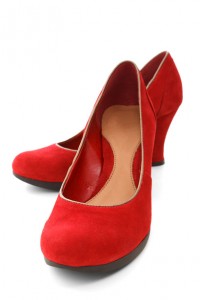A guest post by a reader, Louise.
 Picture the scene: you’re browsing on Amazon and you suddenly notice a cool looking camera on sale, 50% off.
Picture the scene: you’re browsing on Amazon and you suddenly notice a cool looking camera on sale, 50% off.
It’s a great deal; the camera is a good brand, got good specifications and a lot of good reviews…it’s too good an opportunity to miss! So you click ‘Add to Basket’ and eagerly await the delivery of your shiny new camera.
When it arrives, you take a few pictures of your fireplace, the dog and a few passing cars…then leave the camera in a drawer, occasionally taking it out for an annual trip to the zoo or a family Christmas, but mostly you use the 5 megapixel camera on your phone because, well, that’s good enough and it’s more convenient than carrying around a bulky camera all the time.
If this scenario sounds familiar, you’ve suffered from buyer’s remorse. It can be applied to anything; a gorgeous pair of shoes with unfeasibly high heels; “they’ll be fine if I wear jelly insoles”, a camping holiday down in Cornwall; “if it rains we’ll just go to the nearest café”, or a ‘doer-upper’ house “I can finally renovate my own home!”.
Why Do We Do It?
It turns out that we’re very good at lying to ourselves, especially when we want something. The best barrister in the world couldn’t compete with your reasoning if you really, really want that new £45 Xbox 360 game. We’ll convince ourselves that this item will change our lives, that we’ll get hours of fun or use out of it, and that if we ever do decide to sell it on, we’ll get back what we paid for it.
Sadly the reality is often the opposite. That expensive game will be played for an hour, maybe two, then left on the shelf because your busy life just won’t allow you time to relax and play. The pair of shoes will be worn for one night after which you’ll deem them far too painful to ever go near your feet again, and they’ll sit in the bottom of the wardrobe forever.
As for selling them on; have you ever tried to sell a used game months after it was released? They lose value faster than British cars, and you’d be lucky if you got half of your money back. As for shoes; as soon as they’ve been worn once they’re only fit for a car boot where you’d get offered a pound for them from an old lady who thinks her granddaughter might like them.
 Shoes and Savings
Shoes and Savings
Buyer’s remorse isn’t just limited to tangible purchases. Have you ever taken out an insurance policy only to find a better deal a month or two later? Or maybe you’ve gotten a new credit card and later found that the APR is much higher than you expected?
While it’s not buyer’s remorse as such, it’s still a horrible feeling of something being wasted, the object of which will (technically) be much harder to get rid of than a camera or pair of shoes. Opening and then cancelling a credit card could look bad on your credit file, and if you try to cancel an insurance policy you’ll probably face penalty charges.
Avoiding Buyer’s Remorse
Fortunately, it’s quite easy to train your mind to prevent buyer’s remorse from happening. It’s simply a matter of really thinking about your purchase and how it will fit into your life. All too often we think abstractly about something instead of taking the time to consider the finer practical details.
The next time you think about buying something; really think about buying it. If it’s a camera, ask yourself how often you’re really likely to use it. Would you be happy carrying it around everywhere or will your phone camera suffice? If you’re eyeing up a pair of shoes; do you actually have any outfits that they’d go with, and do you already have going-out shoes which don’t cripple you?
In the case of financial products, the key word is compare. Whether it’s credit cards, current accounts, insurance policies or a broadband provider; compare as many different ones as you can. It’s the only way to find out what’s truly the best deal and reduce the risk of buyer’s remorse later on.
Have you ever experienced Buyers remorse?
You must log in to post a comment.